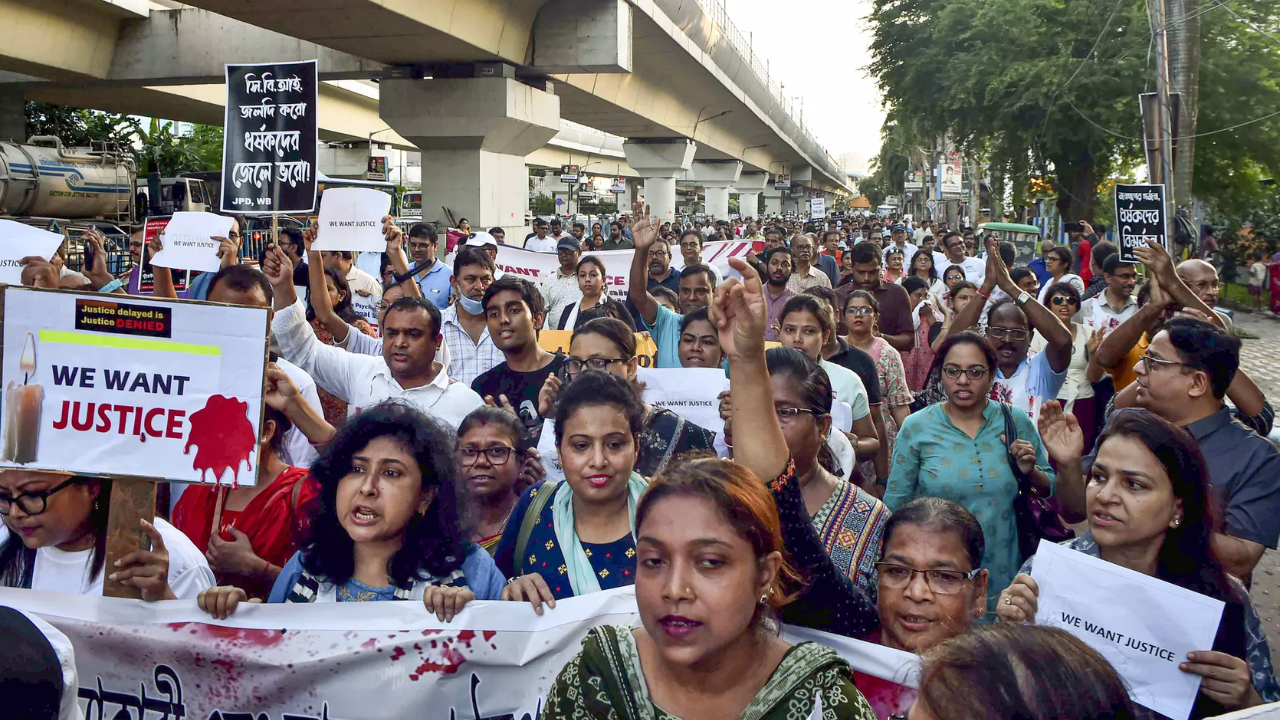NEW DELHI: The proposed anti-rape Bill, set to be introduced by the Mamata Banerjee government in the West Bengal Assembly on Tuesday, suggests the capital punishment for individuals found guilty of rape if their actions lead to the victim’s death or cause her to become vegetative. The draft also mentioned that those convicted of rape and gang rape would be sentenced to life imprisonment for the remainder of their natural lives.
The legislation, named ‘Aparajita Woman and Child Bill, (West Bengal Criminal Laws and Amendment) Bill 2024,’ seeks to strengthen the protection of women and children by modifying and introducing new provisions related to rape and sexual offences.
It proposes amendments to the recently enacted Bharatiya Nyay Sanhita 2023, Bharatiya Nagarik Suraksha Sanhita, 2023 laws, and the Protection of Children from Sexual Offences Act 2012 “in their application to the state of West Bengal to enhance punishment and to constitute the framework for…expeditious investigation and trial of the heinous act of violence against women and children.”
The draft Bill aims to create a safer environment for women and children in the state, saying, “It is a testament to the State’s unwavering commitment to uphold the fundamental rights of its citizens, particularly women and children, and to ensure that heinous acts of rape and sexual offences against children are met with the full force of the law”.
The proposed legislation also introduces changes to the investigation and prosecution process, requiring rape case investigations to be completed within 21 days of the initial report, with a possible extension of up to 15 days. It also suggests the establishment of a ‘Special Task Force‘ at the district level, called ‘Aparajita Task Force’, led by a deputy superintendent of police, to investigate offences under the new provisions.
“To expedite investigations and ensure swift justice for victims, this Bill establishes a dedicated special court and investigation team. These specialised units will be equipped with the necessary resources and expertise to handle cases of rape of women and sexcual offences against children efficiently, effectively and timely, thereby minimising the trauma experienced by victims and their families,” the draft Bill says.
The legislation, named ‘Aparajita Woman and Child Bill, (West Bengal Criminal Laws and Amendment) Bill 2024,’ seeks to strengthen the protection of women and children by modifying and introducing new provisions related to rape and sexual offences.
It proposes amendments to the recently enacted Bharatiya Nyay Sanhita 2023, Bharatiya Nagarik Suraksha Sanhita, 2023 laws, and the Protection of Children from Sexual Offences Act 2012 “in their application to the state of West Bengal to enhance punishment and to constitute the framework for…expeditious investigation and trial of the heinous act of violence against women and children.”
The draft Bill aims to create a safer environment for women and children in the state, saying, “It is a testament to the State’s unwavering commitment to uphold the fundamental rights of its citizens, particularly women and children, and to ensure that heinous acts of rape and sexual offences against children are met with the full force of the law”.
The proposed legislation also introduces changes to the investigation and prosecution process, requiring rape case investigations to be completed within 21 days of the initial report, with a possible extension of up to 15 days. It also suggests the establishment of a ‘Special Task Force‘ at the district level, called ‘Aparajita Task Force’, led by a deputy superintendent of police, to investigate offences under the new provisions.
“To expedite investigations and ensure swift justice for victims, this Bill establishes a dedicated special court and investigation team. These specialised units will be equipped with the necessary resources and expertise to handle cases of rape of women and sexcual offences against children efficiently, effectively and timely, thereby minimising the trauma experienced by victims and their families,” the draft Bill says.
